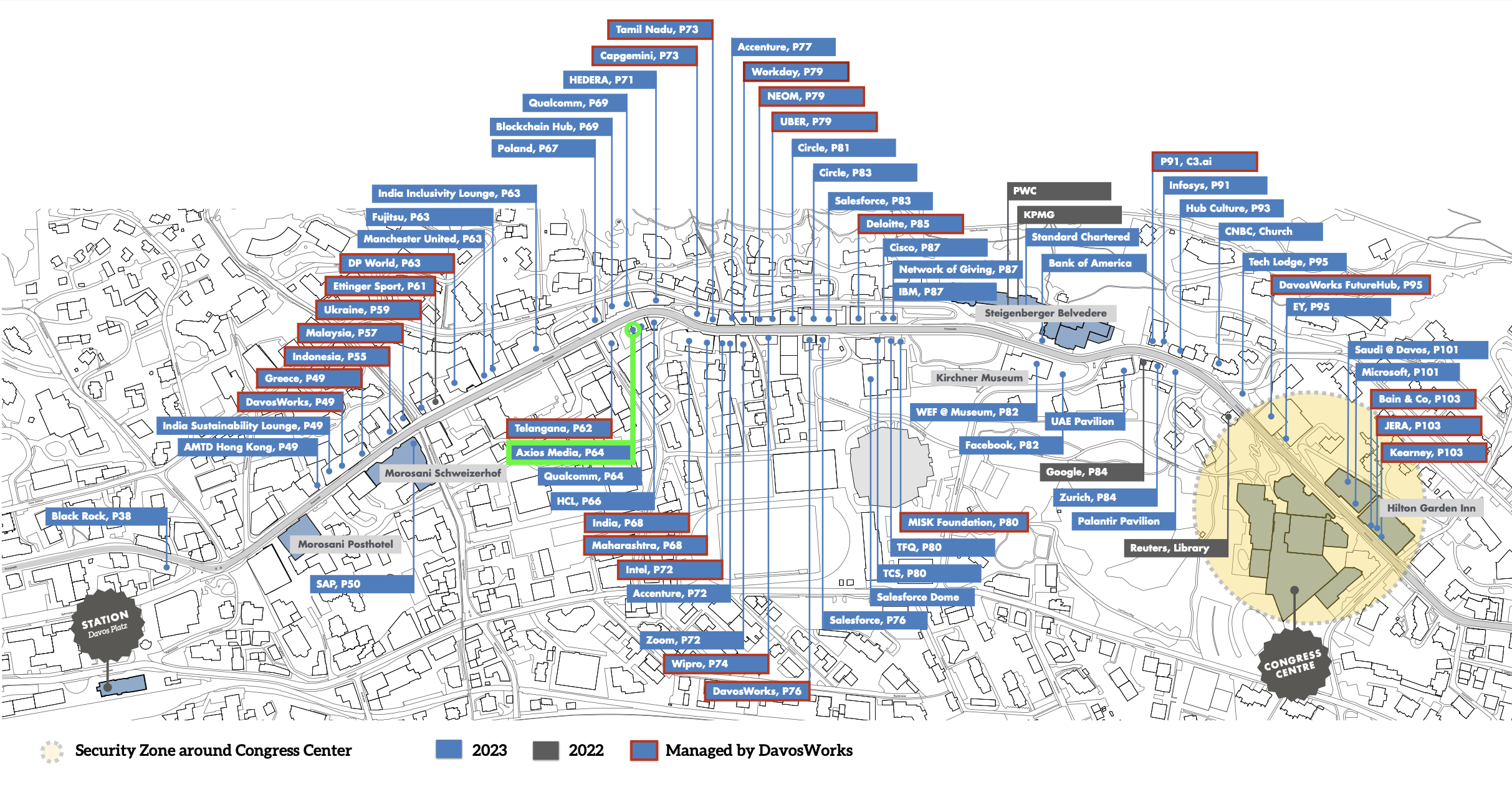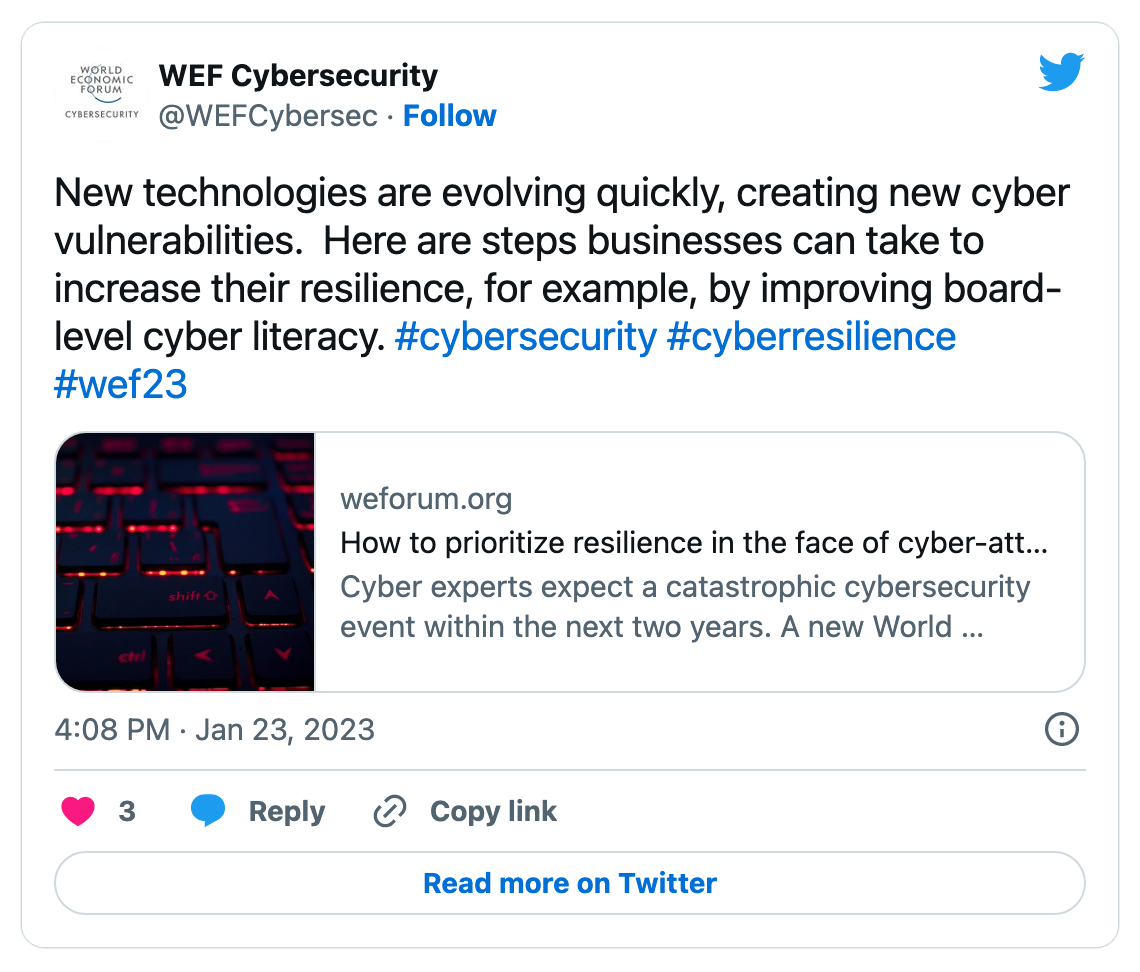A few takeaways from Davos 2023
World Economic Forum Annual Meeting ‘23
“Cooperation in a Fragmented World”
Comicon for Power
The World Economic Forum (WEF) consist of the official congress, the lounges along the city’s Promenade and the less official side events.
During WEF, the entire city of Davos, the surrounding chalets and hotels are filled with political and business leaders - and a slow but steady build-up of representation from culture, too - with lounge sessions and 1:1 meetings starting at 7:00 and ending at midnight. It is the world’s largest meet-up of billionaires, resulting in a slew of VCs, consultants and start-ups ready to pitch you the latest within whatever field you are inclined to reveal your interest in.
To give sense of the scale and amount of activity, this map from DavosWorks shows the Promenade with national- and brand lounges across the Promenade and beyond. The Congress Centre and the security perimeter are shown on the right-hand side. The SDG Goals House, not shown on the map, is situated approximately one kilometre east of the congress centre as it takes over the local golf club each year.
WEF is heavily criticised for being a close elitist ecosystem (if you’re into the whole lizard-people paranoia, this is where one would meet them) and simultaneously embraced and lauded as a platform for real, sincere change. Seemingly divisive, it is universally recognized as a time in space where topics are discussed between political and business spheres years before they become mainstream. I’ve yet to speak to a participant - be it an activist-, business- or political guest - who did not feel empowered or had a mindset-change after visiting Davos.
So, it’s a trip, for sure. If you are interested in the future of tech, climate, equality — anything, really, this melting pot of the world’s opinion leaders is worth paying attention to.
On Tech
The Tech Correction
From across the spectrum of the tech houses represented, the tech correction will continue well into 2023. Alphabets layoffs illustrated the point to a live audience.
"For Googles parent Alphabet, the job cuts affect 6% of its workforce, and follows thousands of layoffs at tech giants including Amazon.com Inc (AMZN.O), Microsoft Corp (MSFT.O) and Meta Platforms Inc (META.O) who are downsizing after a pandemic-led hiring spree left them flabby in a weak economy. "
Reuters
From smaller players at side events, some relief was expressed on the topic of access to a larger and more experienced talent pool. No one seems immune to the market correction happening across sectors. Everyone’s trying to figure out the larger macro implications of the layoffs with some early conclusions ranging from “I told you so” to “oh, it will be refreshing” (meaning - your theory is as good as mine).
Generative AI tools and automation
Most industry leaders from across Accenture, Qualcomm, Microsoft, and Meta bluntly admitted that no one had really seen the AI revolution before it was already upon us. Last year, AI was a niche topic at WEF. At CES a few months ago AI and automation were mostly associated with robotics and a few novel consumer applications.
Chief Technology Correspondant for Axios, Ina Fried, captured the gist of WEF x AI pretty well;
On panels and in side conversations at this week's gathering in Davos, Switzerland — as well as at last week's DLD Conference in Munich — everyone wants to talk about this latest crop of generative AI tools, from how they are experimenting with it personally to how they see it reshaping their businesses and lives.
Read the full article, see both the optimism and scepticism regarding the new models and where they might take us - including new types of bias.
Pro-tip - follow as many business journalists as you do business leaders - sometimes, the information flows with fewer incentives involved.
Three items to remember - courtesy of our consultancy overlords
Accenture’s Chief Technology Officer Paul Daugherty offered his opinion on the three topics which will most impact business transformation over the next 10 years. Conveniently sorted in near-, mid-, and long-term, they are;
Cloud
Do this and do it well. Cloud is the baseline for bringing your analogue retail brand into digital. Without it, you will continue to find too many barriers between your ambition for customer experience and what your teams can deliver.
Artificial Intelligence
While ChatGPT is currently the parlour trick of generative AI models, your teams will soon feel lost without tools to make sense of all your data. Find ways for this to be a compelling tool to give your business an edge. An exoskeleton for your teams. Marketing is an easy-to-grasp corner to start with. Still, many areas of the supply chain benefit tremendously from this type of automation, especially since the technical know-how already exists in those parts of the company.
Metaverse
We laugh today, but in ten years, most brands will be affected by the metaverse. Not the consumer experience - that’s far out in the future - but internal training modules, onboarding, digital twins on an industrial scale and long-distance production know-how. Metaverse is VR and AR combined, not one or the other.
Worth noting is that the last point, Metaverse as a contender in the top three of most essential business-transformation currents - was a controversial topic and raised a few eyebrows. Paul underscored that it was the business application - e.g. digital twins and long-distance training - not the consumer experience he referred to when adding it to the list.
Paul is on Twitter. His upcoming book “Radically Human - How new technology is transforming business and shaping our future”, among many other topics, touches on the need to reskill 1 billion people to thrive in the new economy, a sentiment making the rounds at Davos.
Slide creators at Davos take no prisoners.
Cyber is an arms race we can’t win
Events such as Financial Times Cyber Security: A Leadership priority made an honest attempt of assessing how cyber threats are being intensified by geopolitical activity. Terms like “catastrophic cybersecurity events” are in play.
Gideon Rachman, the chief foreign affairs commentator for the Financial Times, and despite not being a domain expert, expertly moderated several sessions. Gideon is on Twitter.
Shall we play a game?
The conversation in the hallways and at side events was gravitating towards a different core aspect, however. The below is from a security expert specialising in negotiating on behalf om companies whos IP and data has been taken hostage.
“The focus right now seems to be on technical systems and defence mechanisms, but without considering the bigger picture. We are in an arms race to get better protective gear and systems, while the enemy is in a different game - recruiting and educating humans and bots to stay one step ahead of us. In the west, we lack tech know-how and are reactive to the attacks. In the east, people are educated into unemployment, low-level jobs - or, perhaps an opportunity as a cybercriminal. It’s a disproportionate arms race, with no end in sight.
What can we do differently, as businesses and policy makers, to mitigate this?”
The OG Blockchain crowd draws a sigh of relief
Whenever blockchain came up, it was with a sigh of relief. With the crypto-bros finally going bust along with the crypto bubble, it is time for the blockchain world to rebuild and re-emerge as a serious frontier.
Global Emerging Technology Leader Combiz Richard Abdolrahimi from Deloitte, on the Future of Technology panel at Finnish Flow talked about how the path have now been cleared for the real, business driven narrative around the tech. Blockchain and tokenization will help promote the idea of
Blockchain as
Internet of place
Internet of ownership
With complete digital trust and transparency in the ownership and location of data or assets. Combiz, a lawyer turned tech, promoted the idea that once this is normalised into daily operations of global businesses, it will upend how we talk about assets.
Ask simple questions
Vishal Kapoor, Chief Strategy Officer of Chia Network, has a background in tech and learnt the business the hard way, rising up through the ranks. Now on the business side of things, Vishal offered the following insight;
A technical expert will keep talking until you stop them.
As a leader, you should ask simple questions about technology.
And if you don’t get straight answers, ask again.
Maybe - ask someone else.
Is it safe?
Is it compliant?
Is it secure?
The insights were given in the context of blockchain and, really, adhere to any business leader’s approach to emerging tech and cyber security.
It is ok to ask simple questions. It is very hard to provide simple answers.
Official WEF 2023 summary
Find more takeaways, see who’s involved in the WEF organisation and get some of the event highlights.
https://www.weforum.org/events/world-economic-forum-annual-meeting-2023







